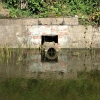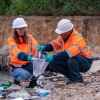
As regulatory requirements and infrastructure demands continue to evolve, stormwater operations training for Department of Public Works (DPW) and Highway Department staff has never been more critical. Effective training ensures that personnel are prepared to safely and efficiently manage stormwater assets, remain compliant with MS4 (Municipal Separate Storm Sewer System) permits, and respond to environmental and public safety concerns in a timely manner.
This article outlines the importance of ongoing stormwater operations training and identifies key resources and opportunities for municipal staff.
Modern stormwater systems are complex networks that require more than just a basic understanding of culverts and catch basins. Staff must be well-versed in:
Inspection protocols for drainage structures
Safe and efficient operation of vacuum and jetting equipment
Confined space entry and personal protective equipment (PPE) requirements
Illicit discharge detection and response
GIS-based asset mapping and digital reporting tools
Ongoing training ensures that DPW staff remain proficient in these areas, adapt to regulatory updates, and utilize new technologies effectively. It also helps protect municipalities from liability and service disruptions due to improperly maintained or misunderstood infrastructure.
While some training can be developed in-house, departments should actively seek out instruction and certification programs offered by external partners. These sources often provide broader technical knowledge, up-to-date regulatory insights, and access to real-world case studies.
Examples of outside training sources include:
State DOTs and Environmental Agencies: Many offer annual MS4 and stormwater management workshops.
Nonprofits and Water Resource Councils: Organizations such as regional planning commissions or watershed alliances frequently host training events.
Private Sector Dealers: Vendors who sell and service sewer cleaning and inspection equipment, such as the Vactor 2100i, often provide valuable on-site and classroom training. These sessions can cover everything from nozzle selection and jetting techniques to preventive maintenance and confined space protocols.
Partnering with these organizations expands the department’s technical capabilities and ensures the workforce remains up-to-date on best practices.
Here are core areas every DPW or Highway Department should cover:
Catch Basin & Culvert Inspection Techniques
Including structural assessments, flow obstructions, and sediment depth evaluations.
Sewer Cleaning Equipment Operation
Especially jet/vac truck operation, nozzle configurations, and debris disposal procedures.
Illicit Discharge Detection and Elimination (IDDE)
Identification, sampling, and reporting techniques to remain MS4-compliant.
Stormwater Infrastructure Mapping
Training in GPS collection, digital asset inventory, and GIS integration.
Emergency Response & Flood Prevention
Protocols for responding to blockages, flash flooding, and storm surges.
Safety Training
Including traffic control in work zones, confined space entry certification, and PPE compliance.
Municipalities should not treat training as a one-time event or box-checking exercise. Instead, training should be:
Recurring (e.g., quarterly safety refreshers)
Documented (logs and certificates kept for every training session)
Diverse (covering both new staff onboarding and advanced techniques for seasoned employees)
Departments should develop a formal training schedule and budget accordingly. Grant funding from state and federal programs can often be used to offset costs.
Stormwater operations training is a cornerstone of effective municipal infrastructure management. By embracing continuous learning and leveraging training offered by dealers, agencies, and water-focused organizations, DPW and Highway Departments can ensure they are prepared for the challenges of modern stormwater management. Well-trained staff not only improve service delivery but also help safeguard public health, protect the environment, and ensure regulatory compliance.

 Stormwater culverts come in a wide range of materials, and each type carries a unique combination of strength, lifespan, cost, and installation consid…
Stormwater culverts come in a wide range of materials, and each type carries a unique combination of strength, lifespan, cost, and installation consid…
 A well managed stormwater program depends on accurate and complete information about every outfall in a community. Outfalls are the final discharge po…
A well managed stormwater program depends on accurate and complete information about every outfall in a community. Outfalls are the final discharge po…
 When crews encounter contaminated sediments during routine work, or when a concerned homeowner reports a suspicious odor or unusual discharge, the sit…
When crews encounter contaminated sediments during routine work, or when a concerned homeowner reports a suspicious odor or unusual discharge, the sit…
 Opening and entering drainage structures requires a practiced, methodical approach that protects workers from unseen dangers and ensures that every st…
Opening and entering drainage structures requires a practiced, methodical approach that protects workers from unseen dangers and ensures that every st…
 Constructed wetlands are engineered systems that mimic the natural processes of a real wetland in order to treat stormwater, wastewater, or other poll…
Constructed wetlands are engineered systems that mimic the natural processes of a real wetland in order to treat stormwater, wastewater, or other poll…
 A complete and accurate stormwater map is one of the most important responsibilities for any community that operates as a Municipal Separate Storm Sew…
A complete and accurate stormwater map is one of the most important responsibilities for any community that operates as a Municipal Separate Storm Sew…